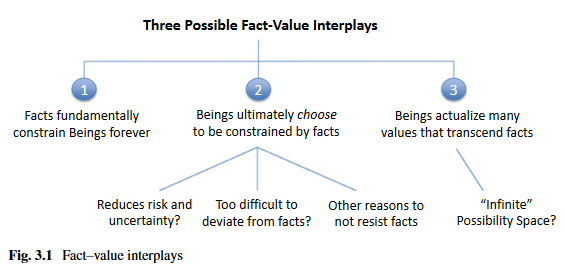Value

Lupisella, Mark. Cosmological Theories of Value: Science, Philosophy, and Meaning in Cosmic Evolution. Cham: Springer, 2020.
Continuation of the evolutionary process as the 'ultimate good'. The processes that sustain the universe and life are of value. Infinite cosmic reproduction of intelligent universes, even beyond ours, is than what is important. These other universes can be artificially produced.
Vidal, Clément. The Beginning and the End: The Meaning of Life in a Cosmological Perspective. Cham: Springer, 2014.
These are some thoughts in response to:
Coghlan, Simon, and Christine Parker. ‘Harm to Nonhuman Animals from AI: A Systematic Account and Framework’. Philosophy & Technology 36, no. 2 (2023): 25. https://doi.org/10/gr4zb5.
Animals
Examples of narrow foci:
- focus on individual
- focus on sentience, happiness, hedonism, etc.
- focus on life
Moral status of animals and their moral worth are problematic as frames because of the zoocentric bias that is a given when one focuses on animals. This focus needs a justification. It is likely that this justification will loop back to pain/pleasure, seeing them in isolation but allowing them to be the primary criterium.
Fundamental Values
Criteria:
- based in evidence
- universal
- productive (testable, practicable)
- respectful (slow?), as it is humans who generate the descriptions (and particular humans at that), the bias will be there, so these questions require the attitude of epistemological modesty
Instead, it seems stronger, more consistent, to focus on or argue for ethics based on the flows of information. In this approach, preservation of patterns emerging from deep history becomes important along with preservation of the momentum and freedom that characterise 'the universe story'. 1
The universe (the first starts, the second generation stars, the Sun with its galaxy, the Solar system, the emergence of planets, habitable zones, life, more complex life with ecosystems, self-regulation, cultures, knowledge, etc.). This story is that of complexification, emergence of more interesting patterns.
Here, the human intervention is simplification, flattening, the loss of information, meaning, practices.
Of course such flattening has happened before for example in small and large extinctions. However, the general trend persists, for example, the current period is the most biodiverse period in the history of the planet, even with the anthropocentric losses.
The human impact is massive but it is wise to consider even this impact with modesty. It is arrogant to claim that humans have the power to make the lasting change on the general course of things (the debate on this is open and depends on the scales of consideration, values, etc.)?
The Need to Reconsider Values
Now, is a uniquely important moment in the planetary history. The consequences of choices are disproportionately significant. Cf. Longtermism
Example of Problematic Values
Harms
Harms is a problematic category, especially when it focuses on individuals. What is harmful for one is good for another. What is harmful in one moment is useful in the next. What seems harmful can actually be beneficial.
Harm to species always harms individuals and the environment. Or at least the division is not clear. Thus, it is incorrect or incomplete to focus on individuals.
These are wrong human categories that is why
Egocentrism and its forms are a problem here. 2 Any 'centrism' is exclusionary and therefore damaging, oppressive, randomly destructive at best, resulting in flattening again. Cf. a parallel discussion on the Forms of Sentience and Future Places. Refocusing on animals transfers the egocentric logic to nonhuman beings but retains the problematic consequences and limitations.
Why the perception of well-being matters so much? Rocks can be harmed as they are parts of life. Indigenous people definitely think so. Children and adults can also easily be upset about harming rocks, give examples.
Wrongs
What is a wrong? This is a circular logic. Why only an amylase can be harmed? Because they feel it? What is feeling? Chemicals. Nonsense.
Amicable do not have ultimate interests. This is simply wrong. From the point of view of genes, from the coevolution and code elopement pints of view too. At least their interests are decentered and do not coincide with what humans think an animal is.
Tories of interests are just silly. They also denigrate animals. Humans can choose harm for reasons outside intestate and the other beings can do it toointentionally or benefiting and not.
Cf protecting the young or the ecological traps.
The universe is about creativity and future. So the capabilities approach is better. There not life in pleasure and the lack of stress and harm. This leads to illness and misery. Life is about potential and striving, not about the rearguard and selfish grabbing to satisfy perceptual illusions that are simply evolved mechanisms
Defend the freedom of evolution, freedom of plasticity, freedom of mistake creativity and experimentation, such as reading bad food, etc
Away with patriarchal control and externaparties knowing best
Working out is harm, learning is harm, immunity needs harm, birthing needs harm. All benefitial harms.
Harm and disease are simply processes
This view also denies animals culture, knowledge, expertise, casting them as new savages and
Footnotes
See, 'ecozoic era', Berry, Thomas. The Great Work: Our Way into the Future. New York: Bell Tower, 1999. Also: Swimme, Brian, and Thomas Berry. The Universe Story: From the Primordial Flaring Forth to the Ecozoic Era—A Celebration of the Unfolding of the Cosmos. New York: HarperCollins, 1992. The 'earth jurisprudence' narrative based on this.˄
Strong obstacles preventing understanding include indifference, but also egocentrism, ethnocentrism, sociocentrism. These are forms of a common tendency "to place oneself at the center of the world and consider everything that is distant or foreign as secondary, insignificant or hostile". Morin, Edgar. ‘Seven Complex Lessons in Education for the Future’. Translated by Nidra Poller. Fontenoy: UNESCO, 1999.˄
Backlinks